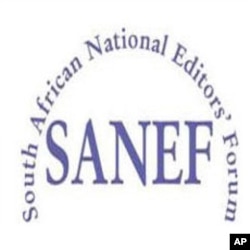The deputy chairperson of the South African National Editors Forum (SANEF) said her organization will do everything possible to stop a proposed media tribunal to regulate the work of journalists.
This comes after the ruling African National Congress (ANC) proposed a Media Appeals Tribunal that would investigate complaints of inaccurate or unfair reporting and hold journalists accountable.
SANEF deputy chairperson Mary Papayya said a government-controlled tribunal would undermine media freedom guaranteed under the constitution.
“We are totally opposed to any form of state-controlled or state regulation of the media. At SANEF we are fully behind the concept of self-regulation. We believe that the South African concept of self-regulation through a press ombudsman has been working very well. We think that it is very worrying that there are talks of a state or ANC-controlled tribunal. We think that this flies in the face of media freedom, and that it is unconstitutional and it has no place in our democracy,” she said.
ANC officials have criticized South African journalists for allegedly flawed reporting and what they called a lack of ethics.
Papayya said there are options for recourse for those who feel they might have been wronged by the media.
“We do have the print ombudsman if it is a print inaccuracy; we have the broadcast Complaints Commission if it is broadcast inaccuracy, and thirdly we have the courts. And we find that in all aspects those have been tried, and individuals had gone ahead and use either of those three bodies to get recourse to inaccuracies or problems,” Papayya said.
She expressed regrets that too often those with complaints of media inaccuracies have chosen not to take their concerns first to editors.
Papayya also criticized a legislation currently being considered in the South African parliament that would allow the government to classify a broad range of material that is not currently considered secret.
“That particular bill can have severe consequences for journalists. It means that there will be no access to certain types of information that is regarded as a state secret. It could lend journalists in jail for up to 25 years if they do break the law,” Papayya said.
She said SANEF has embarked on a campaign to fight the proposed media tribunal and in particular the Protection of Information Bill.
“We are embarking on a lobbying campaign against these kinds of punitive legislation and also against any state-controlled measure that would want to control media or the registration of journalists because we that it is unconstitutional,” she said.
Papayya said the South African National Editors Forum believes that no journalist is above the law and that it is imperative for the media to run retractions and corrections when a mistake has been made in their reporting.











